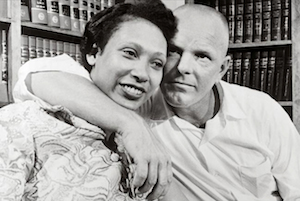For a state whose marketing slogan has long been “Virginia Is For Lovers”, it sure does like to make laws preventing many of those lovers from marrying each other. Fortunately, federal courts exist to remind Virginia of the Constitution of the United States. (Which is ironic since one of Virginia’s greatest sons, James Madison, is remembered as “the Father of the Constitution” and had a hand in writing much of it. You’d think they’d pay a little more attention to it, huh?)
In 1958, Mildred Jeter and Richard Loving traveled from Virginia to Washington DC to get married, and then returned home to Virginia. Police raided their home in the middle of the night and arrested them for the crime of miscegenation (interracial marriage). They were each given a sentence of one year in prison – suspended on the condition that they leave Virginia immediately.
So the Lovings moved to DC, where they were legally married, to live their lives. Nine years later, on 12 June 1967, the U.S. Supreme Court handed down its landmark decision in Loving v. Virginia. It struck down all of the country’s remaining miscegenation laws (throughout the South, of course) and forever removed race-based legal restrictions on marriage in the United States.

Mildred + Richard Loving
Plus ça change, plus c’est la même chose…
Nearly 50 years later, a new legal challenge to another Virginia marriage law is making its way through the federal courts. Today’s ruling by U.S. District Court Judge Arenda Wright Allen struck down as unconstitutional Virginia’s prohibitions against same-sex marriage, or the recognition of legal same-sex marriages performed in other states. As a preface to the 41-page ruling, Judge Allen incorporated these comments made by Mildred Loving in 2007 on the 40th anniversary of the Loving v. Virginia ruling:

 “Government has no business imposing some people’s religious beliefs over others.” Words to live by. Today’s ruling has been stayed pending the inevitable appeal to the Fourth Circuit Court of Appeals, and will almost certainly then be headed to the U.S. Supreme Court. There are similar legal cases moving through the federal judiciary all across the country. Eighteen states and the District of Columbia already provide for marriage equality, and the federal government has moved swiftly to recognize these legal marriages since the Supreme Court struck down the so-called “Defense of Marriage Act” last year. So, America is in a remarkably similar position with regard to “gay marriage” as it was in 1967 with “interracial marriage”. And the day is coming when the Supreme Court will decide the case which puts an end, once and for all, to anti-gay bias in marriage laws in the United States. That won’t put an end to ignorant or hateful people… but it will make their ignorance and hatred legally irrelevant to the rest of us.
“Government has no business imposing some people’s religious beliefs over others.” Words to live by. Today’s ruling has been stayed pending the inevitable appeal to the Fourth Circuit Court of Appeals, and will almost certainly then be headed to the U.S. Supreme Court. There are similar legal cases moving through the federal judiciary all across the country. Eighteen states and the District of Columbia already provide for marriage equality, and the federal government has moved swiftly to recognize these legal marriages since the Supreme Court struck down the so-called “Defense of Marriage Act” last year. So, America is in a remarkably similar position with regard to “gay marriage” as it was in 1967 with “interracial marriage”. And the day is coming when the Supreme Court will decide the case which puts an end, once and for all, to anti-gay bias in marriage laws in the United States. That won’t put an end to ignorant or hateful people… but it will make their ignorance and hatred legally irrelevant to the rest of us.
And that makes me so very gay… you know, happy.
Day 038 #100happydays
